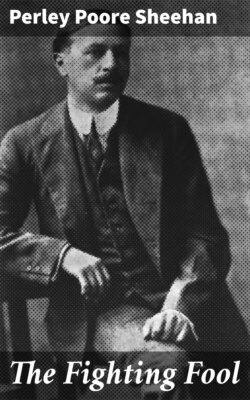Читать книгу The Fighting Fool - Perley Poore Sheehan - Страница 4
На сайте Литреса книга снята с продажи.
II
ОглавлениеTable of Contents
THERE is a sort of universal language, more of looks than of words or gestures--the sort of communication that had already thrown Shattuck on his guard. In the same way he could grasp the thought of these four now as they let their weapons fall.
"Here is a mad fool! We'll get him later!"
Shattuck pushed the four guns into a pile with his foot. One was a modern sporting rifle---English, he surmised. The others looked like copies of older models--clumsy imitations, but effective enough, such as might have been made in Lhassa or Kabul.
Even with his eyes down he surprised a movement from one of the younger men.
The emergency was so sharp that Shattuck spoke up in English.
"Do you want to die?"
The young man had started to signal the camp in the valley. He'd done so already, perhaps. With their telescopic eyes most of these hill-men could flash signals or read them across amazing distances.
There was a lull, then the leader of the four spoke up.
"Huzoor--"
THAT was vernacular, an address of respect; but the rest of it was coming in English--as slowly, as creakingly, as a door forced open on rusty hinges, but English.
"Excellence, we mean you no harm; and I take it that you mean us no harm."
"Who are you?"
"Your servant, Tsarong!"
The humility was too great to be sincere. Shattuck looked the old man in the eye. The gaze that met his was veiled and shrewd.
"Who are your people?"
"Just a few poor Changpas."
Changpas! People from the Chan-tang!
As the meaning of this simple statement flashed into Shattuck's mind it was all that he could do to suppress a start. Even so he divined an answering start in the eyes of the old man.
The Changpas were Tibetans--the people of the tang, the desert plains of Tibet's Far West. It was an affair of Tibet and Russia that had got Shattuck into trouble with the Cheka, the Soviet Secret Service.
Shattuck smiled pleasantly.
"Sit down, Father Tsarong," he invited; "and tell your friends to sit down. Thus! You four sit down with your backs to the camp and I'll sit here in front of you. Like that, should you see any other of your people coming from behind me, you can signal them not to shoot--as they might miss and shoot you instead."
Old man Tsarong hesitated.
"We are unworthy of that honor," he said. "Only our lord, the general, is worthy such an honor."
"What you say is perfectly true," Shattuck replied. "Send for him."
"Send for him! He is the governor of the entire Chantang!"
"Father, do as I say. Tell him you've met an earth demon who knows everything. I know all about those Russian arms you've come to this valley to get. Dorje-Pamo, the pig-faced goddess, told me about them herself."
The old man was stricken.
He mumbled an order and the three others---including the other elder himself--were for setting off together. But Shattuck stopped the rush. Only one was to go, and he was to be the best runner among them.
As the runner started off down the mountainside, Shattuck could see that there was already some alarm in the camp. A string of yaks, horses, sheep and goats had begun to straggle in from behind a shoulder of the hill, driven by women and children.
"Are you not, then, English?" Tsarong asked.
"Ameriki," Shattuck replied.
HE could see that the word meant nothing to the Tibetans. To them all white foreigners were English--that, or possibly Oross, Russian.
`The three Tibetans sat in front of him and below him at a respectful distance, facing him, their backs to the camp. Shattuck also had folded his legs and seated himself on the ground, the four surrendered rifles piled in front of him and his own weapon across his knees.
The queer thought came to him that he was no longer an outcast and a man without a country, after all. He was now as a king seated on a throne.
The throne was a mountain. He had an arsenal. He had subjects who looked at him with awe, speculating, like other subjects, on the divinity of kings.
There was something about the vast panorama that surrounded him, that stimulated this thought--stimulated it to the point of sheer craziness. Yet, hereabouts, there were still legends of Alexander the Great, of Ghengis Khan and Kubla Khan and Tamerlane.
There was a persistent legend that from this part of the world would come the next great King of the World.
The three Tibetans were watching him. He was watching them.
"I am Pelham Rutledge Shattuck," he announced slowly.
He was making the announcement for himself as much as he was for them. It sounded strange to hear his own name spoken like that, even by his own voice, here in this Himalayan space. It was like some sort of a mantram--a spell. The name went vibrating off into the blue of Central Asia.
The Tibetans looked puzzled, even old Tsarong.
"Shattuck! Get that?"
There was a respectful murmur.
"Repeat it," Shattuck told them. "Shattuck!"
They tried it--first Tsarong, the linguist, then the others. They also seemed to think that it was some sort of a spell.
"Sha-dak!" "Sha-dak!" "Sha-dak!"
It might have been a spell, at that. As they pronounced it the name became a Chinese word meaning "trouble": Shadak.
They were repeating it with honorary titles added:
"Shadak-la!"
"Shadak-beg!"
"Shadak-khan!"
"My God," Shattuck muttered. "That's who I am, all right!"
In the silence of his thought it was as if an echo of silent thunder had come rolling back upon him out of space, calling him by a name to which he was fated:
"Captain Trouble!"
